Bios 256 week 3 - Study guides, Class notes & Summaries
Looking for the best study guides, study notes and summaries about Bios 256 week 3? On this page you'll find 71 study documents about Bios 256 week 3.
Page 4 out of 71 results
Sort by
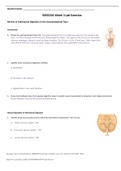
-
BIOS 256 Week 3 Lab ( Review of Mechanical Digestion in Gastrointestinal Tract)
- Exam (elaborations) • 9 pages • 2022
- Available in package deal
-
- $10.99
- + learn more
BIOS 256 Week 3 Lab Part: Lab Exercise: Review of Mechanical Digestion in Gastrointestinal Tract Show Less
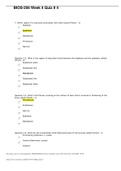
-
BIOS-256 Week 4 Quiz # 4 (GRADED A) Questions and Answer elaborations | Chamberlain College of Nursing
- Exam (elaborations) • 5 pages • 2022
- Available in package deal
-
- $10.99
- + learn more
BIOS-256 Week 4 Quiz # 4 Question.Which region of a long bone articulates with other bones? (Points : 3) Question. What is the region of long bone found between the diaphysis and the epiphysis calle d? (Points : 3) Question. What is the fibrous covering on the surface of bone that is involved in thickening of the bone called? (Points : 3) Question. What are the extracellular fluid-filled extensions of the lacunae called? (Points : 3) Question. How are osteons in compact bone tissue aligned? (Poi...
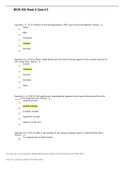
-
BIOS 256 Week 5 Quiz # 5 (GRADED A) Questions and Answers | Download To Score An A
- Exam (elaborations) • 5 pages • 2022
- Available in package deal
-
- $10.99
- + learn more
BIOS 256 Week 5 Quiz # 5 Question. (TCO 5) Which of the following bones is NOT part of the axial skeleton? (Points : 3) Question. (TCO 5) These cranial bones form the inferior lateral aspects of the cranium and part of the cranial floor. (Points : 3) Question. (TCO 5) The hyoid bone is suspended by ligaments and muscle that extend from the _____ of the temporal bone. (Points : 3) Question. (TCO 5) What is the purpose of the nucleus pulposus region of intervertebral discs? (Points : 3) Question. ...
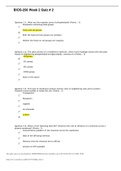
-
BIOS-256 Week 2 Quiz # 2 (LATEST UPDATE) | 100% correct answers
- Exam (elaborations) • 5 pages • 2022
- Available in package deal
-
- $10.99
- + learn more
BIOS-256 Week 2 Quiz # 2 Question. What are the nonpolar parts of phospholipids? (Points : 3) Question. The polar portion of a cholesterol molecule, which forms hydrogen bonds with the polar heads o f neighboring phospholipids and glycolipids, consists of a (Points : 3) Question. This type of membrane protein anchors cells to neighboring cells and to protein filaments found outside or inside the cell. (Points : 3) Question. Which of the following does NOT influence the rate of diffusion of a che...
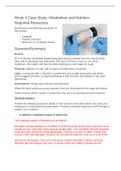
-
BIOS 256 Week 3 Case Study; Metabolism and Nutrition
- Other • 2 pages • 2022
- Available in package deal
-
- $20.49
- + learn more
Required Resources Read/review the following resources for this activity: • Textbook • WeeklyConcepts • Minimum of 1 scholarlysource Scenario/Summary History: BT is a 36-year-old female experiencing pain during urination over the course of two days and is urinating more frequently. She does not have a fever or any other symptoms. She states she has not been drinking as much water as usual. Physical: abdomen is soft, with no signs of tenderness or masses Labs: a urinalysis with...
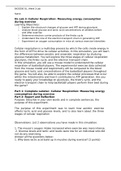
-
BIOS 256 Week 3 OL Lab 3; Cellular Respiration; Measuring energy consumption during exercise
- Other • 3 pages • 2022
- Available in package deal
-
- $20.49
- + learn more
Learning Objectives: • Explain the structural changes of glucose and ATP duringglycolysis • Analyze blood glucose and lactic acid concentrations of athletes beforeand after exercise • Determine electron carrier products of the Krebscycle • Understand the role of the electron transport chain in generatingATP • Experiment on oxygen consumption in mice at various exerciseintensities Cellular respiration is a multistep process by which the cells create energy in the form of ATP to ...
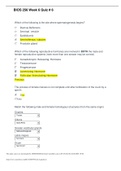
-
BIOS 256 Week 6 Quiz # 6 (TOP SCORE) | Chamberlain College of Nursing
- Exam (elaborations) • 3 pages • 2022
- Available in package deal
-
- $10.99
- + learn more
BIOS 256 Week 6 Quiz # 6 Question. (TCO 6) Which of the following—syndesmoses, gomphosis, or suture—is a type of fibrous joint composed of a thin layer of dense irregular fibrous connective tissu e found between the bones of the skull? (Points : 3) Question. (TCO 6) Which of the following types of joints—fibrous, cartilaginous, or synovial—do NOT have a synovial cavity? (Points : 3) Question. (TCO 6) Which of the following joints—gomphosi, synchondrosis, or suture—is classified as a ...
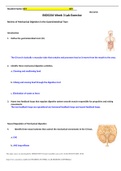
-
BIOS 256 Week 3 Lab ( Review of Mechanical Digestion in Gastrointestinal Tract) BIOS 256 Week 3 Lab Part: Lab Exercise: Review of Mechanical Digestion in Gastrointestinal Tract Show Less
- Exam (elaborations) • 9 pages • 2022
-
- $10.89
- + learn more
BIOS 256 Week 3 Lab ( Review of Mechanical Digestion in Gastrointestinal Tract) BIOS 256 Week 3 Lab Part: Lab Exercise: Review of Mechanical Digestion in Gastrointestinal Tract
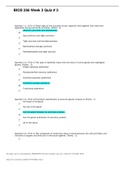
-
BIOS 256 Week 3 Quiz 3 (GRADE A) Questions and Answers | Highly Rated Paper
- Exam (elaborations) • 5 pages • 2022
- Available in package deal
-
- $10.99
- + learn more
BIOS 256 Week 3 Quiz # 3 Question. (TCO 3) These types of cell junctions anchor adjacent cells together and resist their separation during contractile activities. (Points : 3) Question. (TCO 3) This type of epithelial tissue lines the ducts of sweat glands and esophageal glands. (Points : 3) Question. (TCO 3) Functional classification of exocrine glands is based on (Points : 3) Question. (TCO 3) This component of connective tissue is found between the cells and fibers and functions to support an...
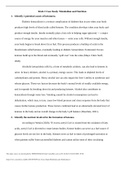
-
BIOS 256 Week 3 Case Study Metabolism and Nutrition
- Case • 3 pages • 2022
- Available in package deal
-
- $14.49
- + learn more
BIOS 256 Week 3 Case Study Metabolism and Nutrition/BIOS 256 Week 3 Case Study Metabolism and NutritionBIOS 256 Week 3 Case Study Metabolism and NutritionBIOS 256 Week 3 Case Study Metabolism and NutritionBIOS 256 Week 3 Case Study Metabolism and NutritionBIOS 256 Week 3 Case Study Metabolism and NutritionBIOS 256 Week 3 Case Study Metabolism and NutritionBIOS 256 Week 3 Case Study Metabolism and NutritionBIOS 256 Week 3 Case Study Metabolism and NutritionBIOS 256 Week 3 Case Study Metabolism an...

How did he do that? By selling his study resources on Stuvia. Try it yourself! Discover all about earning on Stuvia


